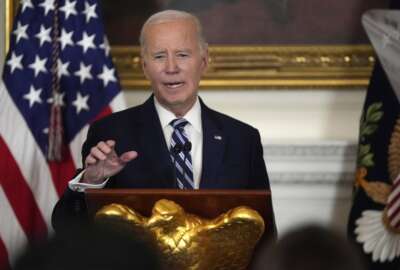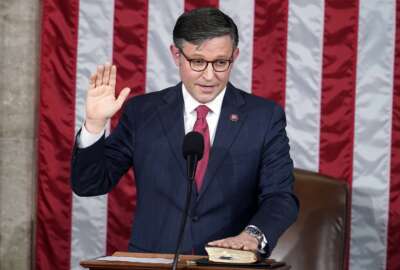Trump tax cut: Huge, vague and likely mild boost for economy
President Donald Trump's team boasted Wednesday that its tax-cut plan would shrink Americans' financial burdens, ignite economic growth and vastly simplify tax...
WASHINGTON (AP) — President Donald Trump’s team boasted Wednesday that its tax-cut plan would lighten Americans’ financial burdens, ignite economic growth and vastly simplify tax filing.
Yet the proposal so far remains short of vital details, including how it would be paid for. And based on the few specifics spelled out so far, most experts suggest that it would add little to growth while swelling the budget deficit and potentially handing large windfalls to wealthier taxpayers.
Trump’s plan would replace the current seven income tax brackets with three, and the top bracket would drop from 39.6 percent to 35 percent. It would also slash the corporate rate from 35 percent all the way to 15 percent, a boon to most companies even though many don’t pay the full tax now. With tax credits and other loopholes, most corporations pay closer to 20 percent, according to calculations by JPMorgan.
Perhaps the most contentious plank would enable taxpayers with business income — including those wealthy enough to pay the top tax rate — to instead pay the new 15 percent corporate rate. That’s because Trump would apply the corporate rate to “pass through” businesses. Pass-throughs include partnerships such as law firms and hedge funds as well as most small businesses — from the local florist to the family-owned restaurant on Main Street.
What’s more, some privately held large companies — including Trump’s own real estate empire — are structured as pass-throughs and would benefit, too.
Here’s a closer look at Trump’s proposal and its likely impact:
___
WHO BENEFITS?
It’s hard to say because the administration has released so few details. The three new income tax rates would be 10 percent, 25 percent and 35 percent. But Trump’s top economic adviser, Gary Cohn, and Treasury Secretary Steven Mnuchin, weren’t ready Wednesday to say at what income levels these new rates would kick in.
Tax experts said far more details were needed to determine how average Americans would be affected.
“The impact on Joe Taxpayer is unknown,” said Marc Gerson, vice chair of the tax department of law firm Miller & Chevalier in Washington. “There’s not enough specificity. It’s hard for taxpayers to determine where they’ll come out.”
Cohn asserted that the plan would cut taxes “especially for low and middle income families.” It purports to do so in part by doubling the standard deduction, which is used by taxpayers who don’t itemize their tax deductions.
At the same time, the Trump plan would eliminate the estate tax and the alternative minimum tax, thereby benefiting some of the richest taxpayers. And that’s on top of shrinking the corporate tax rate that many affluent individuals could likely capitalize on.
___
WHY CUT CORPORATE TAXES?
By making corporations more profitable, the Trump administration hopes to encourage more business spending on equipment — from computers to factories and machinery.
Doing so, in turn, could make the economy more efficient and accelerate growth and hiring. Economic growth has been stuck at about 2 percent a year since the recession ended in 2009. Mnuchin says the administration wants to accelerate it above 3 percent, a pace it hasn’t touched since 2005.
The corporate tax cuts are also intended to encourage more businesses to stay in the United States, which now has the highest corporate rate among advanced economies.
Many large corporations are enthusiastic about lower rates and say they support the elimination of loopholes, which both reduce revenue and make taxes more complicated.
___
WHO’D BENEFIT FROM THE CORPORATE RATE CUT?
Aside from most large companies, many partnerships and small businesses would benefit because they’re structured as pass-throughs, which derives from the fact that they pass on their profits to their owners.
Those owners now pay individual income tax rates, which top out at 39.6 percent. With the pass-through rate dropped to 15 percent, those taxpayers could enjoy an enormous tax cut.
The Trump team stressed the benefits that might flow to small businesses. But the richest windfalls would flow to the wealthy — lawyers, hedge fund managers, consultants and other big earners. Nearly 75 percent of pass-through income flows to the 10 percent wealthiest taxpayers, according to the liberal Center on Budget and Policy Priorities.
“It would tremendously help high earners,” says Brian Thompson, a certified public accountant in Chicago.
In Kansas, Gov. Sam Brownback eliminated state taxes on pass-throughs, which turned out to be a boon for Bill Self, the coach of the University of Kansas’ men’s basketball team. He had previously set up his own company, according to state media reports. As a result, he paid little state income tax despite earning nearly $3 million a year.
Many people, particularly wealthy Americans, could set up companies and reclassify their paychecks as “business income” and have it taxed at 15 percent, experts say. In Kansas, the number of pass-through businesses jumped to more than double the level the state expected, according to the nonpartisan Tax Policy Center. That cost the state revenue without spurring more job creation.
Mnuchin said the Treasury would issue rules to prevent wealthy people from capitalizing on the lower rate. But many experts are skeptical.
“Good luck with that,” said Mark Mazur, director of the nonpartisan Tax Policy Center and a former Treasury official under President Barack Obama. “The tax agencies tend to be at least a couple of steps behind the businesses.”
___
HOW ELSE WOULD BIG BUSINESSES BENEFIT?
The administration is also proposing to tax only corporate income earned in the United States. This is known as a “territorial” system. It would replace the current worldwide system, under which corporations pay tax on income earned in the U.S. and overseas.
Yet companies can avoid the tax if they keep their foreign earnings overseas. Many businesses have kept hundreds of billions of dollars outside the United States.
Mnuchin said Trump’s plan would encourage corporations to return the money to the United States and invest it in plants and equipment. Some analysts counter that corporations might instead use the money to pay dividends to shareholders.
___
WHAT ABOUT THE DEFICIT AND GROWTH?
The government’s budget deficit could explode under the plan, offsetting many of the benefits for the economy, economists say. The Committee for a Responsible Federal Budget’s rough estimate puts the loss of revenue at $5.5 trillion over 10 years.
Mnuchin argued that the tax cuts would spur faster growth, which, in turn, would produce more tax revenue. And the elimination of tax deductions and other loopholes would raise revenue as well, he contended.
But the Trump team offered few details on which deductions would be dropped — a move that would likely spark ferocious opposition from the beneficiaries of those deductions. And most economists don’t accept the notion that growth would accelerate enough to offset the lost revenue.
Alan Cole, an economist at the right-leaning Tax Foundation, calculates that the corporate tax cuts alone would reduce government revenue by $2 trillion over 10 years. That would require growth to accelerate nearly a full percentage point, to 2.8 percent a year, from its current level. Yet Cole forecasts that growth would increase only 0.4 percent annually.
Other economists say that if the cuts balloon the deficit, the resulting jump in government borrowing would swell interest rates and make it harder for businesses and households to borrow and spend.
Ethan Harris, chief global economist at Bank of America Merrill Lynch, says such a “crowding out” effect can cancel out any benefits to the economy.
___
SO WILL THE ECONOMY BENEFIT AT ALL?
Most economists forecast that a modest tax-cut package — smaller than Trump’s — is far more likely to become law. With the deficit rising by less, a smaller cut could raise growth to 2.5 percent a year, from its roughly 2 percent pace now, Harris said.
If Trump’s proposals became law, depending on the details, growth could accelerate more quickly, Harris added. But the Federal Reserve would likely counter such acceleration with more short-term rate hikes, to forestall rapid inflation. And that move, in turn, would likely slow the economy.
___
Joseph Pisani and Paul Harloff in New York contributed to this report.
___
Contact Chris Rugaber on Twitter at http://Twitter.com/ChrisRugaber
Copyright © 2025 Federal News Network. All rights reserved. This website is not intended for users located within the European Economic Area.





